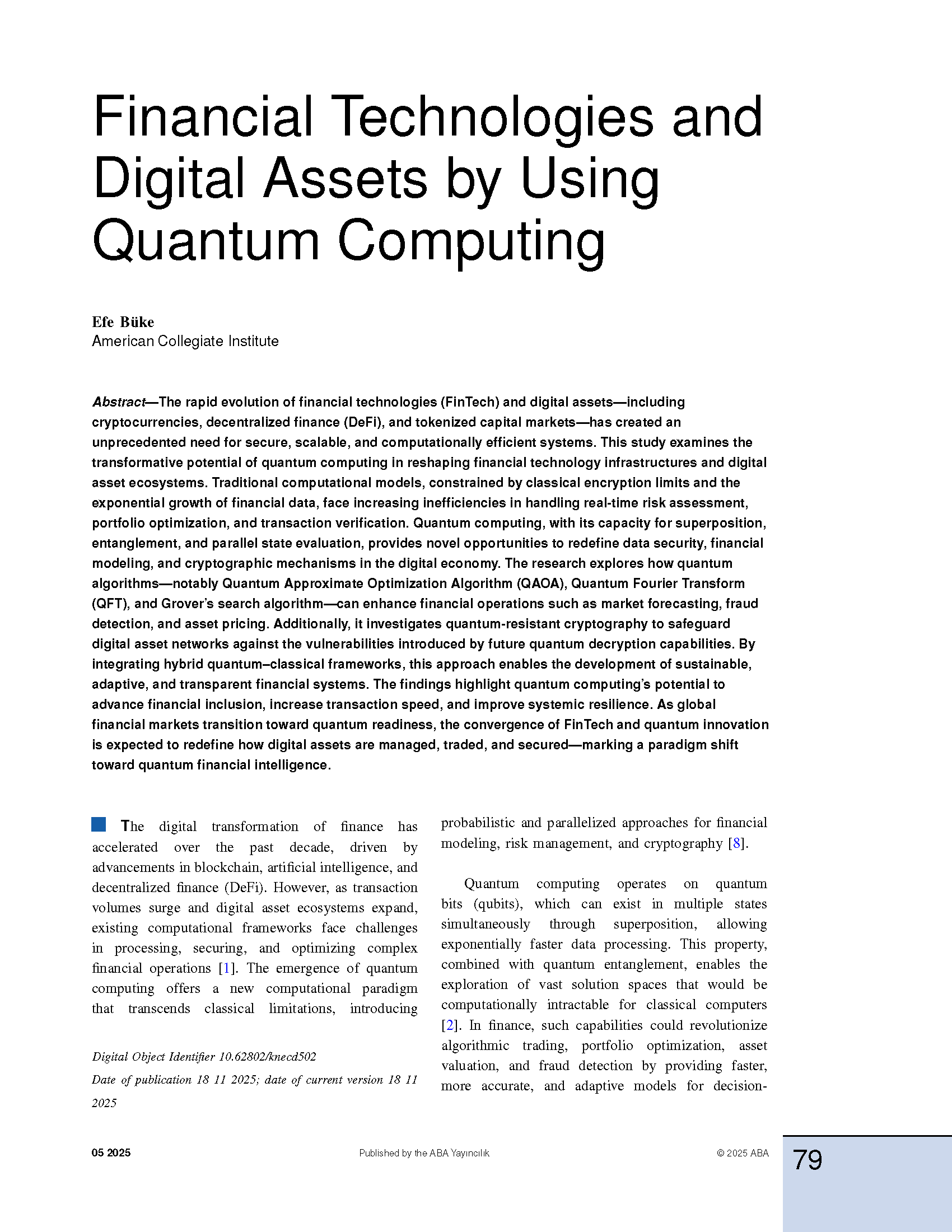Financial Technologies and Digital Assets by Using Quantum Computing
DOI:
https://doi.org/10.62802/knecd502Keywords:
quantum computing, financial technology, digital assets, DeFi, quantum cryptography, quantum optimization, blockchain, quantum financeAbstract
The rapid evolution of financial technologies (FinTech) and digital assets—including cryptocurrencies, decentralized finance (DeFi), and tokenized capital markets—has created an unprecedented need for secure, scalable, and computationally efficient systems. This study examines the transformative potential of quantum computing in reshaping financial technology infrastructures and digital asset ecosystems. Traditional computational models, constrained by classical encryption limits and the exponential growth of financial data, face increasing inefficiencies in handling real-time risk assessment, portfolio optimization, and transaction verification. Quantum computing, with its capacity for superposition, entanglement, and parallel state evaluation, provides novel opportunities to redefine data security, financial modeling, and cryptographic mechanisms in the digital economy. The research explores how quantum algorithms—notably Quantum Approximate Optimization Algorithm (QAOA), Quantum Fourier Transform (QFT), and Grover’s search algorithm—can enhance financial operations such as market forecasting, fraud detection, and asset pricing. Additionally, it investigates quantum-resistant cryptography to safeguard digital asset networks against the vulnerabilities introduced by future quantum decryption capabilities. By integrating hybrid quantum–classical frameworks, this approach enables the development of sustainable, adaptive, and transparent financial systems. The findings highlight quantum computing’s potential to advance financial inclusion, increase transaction speed, and improve systemic resilience. As global financial markets transition toward quantum readiness, the convergence of FinTech and quantum innovation is expected to redefine how digital assets are managed, traded, and secured—marking a paradigm shift toward quantum financial intelligence.
References
Adejumo, A., & Ogburie, C. (2025). Strengthening finance with cybersecurity: Ensuring safer digital transactions. World Journal of Advanced Research and Reviews, 25(3), 1527-1541.
Columbus Chinnappan, C., Thanaraj Krishnan, P., Elamaran, E., Arul, R., & Sunil Kumar, T. (2025). Quantum Computing: Foundations, Architecture and Applications. Engineering Reports, 7(8), e70337.
Feng, T., Shen, Z., Zhao, X., Lu, X., & Zhou, Y. (2025, August). CryptoMixer: Fine-grained market information-aware MLP Networks for Individual Cryptocurrency Trading Prediction. In Proceedings of the 31st ACM SIGKDD Conference on Knowledge Discovery and Data Mining V. 2 (pp. 603-614).
Jain, R. (2025). Cutting-Edge Developments in Science, Engineering and Technology: A Multidisciplinary Review. Available at SSRN 5197905.
Neethu, V. A., & Khan, M. A. (2025). Securing Data Privacy and Integrity in Cloud Computing Using Blockchain and Quantum Cryptography. Metallurgical and Materials Engineering, 31(4), 137-145.
Raza, S. A., Syed, D., Rizwan, S., & Ahmed, M. (2025). Quantum Computing and Its Implications for Financial Markets. In The Global Evolution, Changing Landscape and Future of Financial Markets: From Traditional to Digital (pp. 119-131). Emerald Publishing Limited.
Whig, A., Gupta, V., Bansod, M., Gupta, S. K., & Whig, P. (2025). AI, blockchain, and quantum finance: The transformative power of emerging technologies in the financial industry. The Impact of Artificial Intelligence on Finance: Transforming Financial Technologies, 1-20.
Zhou, J. (2025). Quantum finance: Exploring the implications of quantum computing on financial models. Computational Economics, 1-30.


